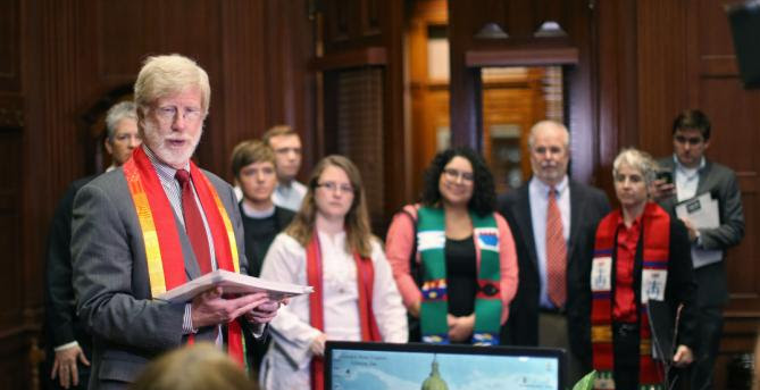US religious leaders make forceful appeal to admit refugees
By RACHEL ZOLL
ASSOCIATED PRESS
http://news.yahoo.com/us-religious-leaders-forceful-appeal-admit-refugees-173908562.html
November 21, 2015
In rare agreement across faith and ideological lines, leaders of major American religious groups have condemned proposed bans on Syrian refugees, contending a legitimate debate over security has been overtaken by irrational fear and prejudice.
Top organizations representing evangelicals, Roman Catholics, Jews and liberal Protestants say close vetting of asylum seekers is a critical part of forming policy on refugees. But these religious leaders say such concerns, heightened after the Paris attacks a week ago, do not warrant blocking those fleeing violence in the Middle East.
"The problem is not the Syrian refugees," said Archbishop Thomas Wenski of Miami, who noted how his state has welcomed a large number of Cuban refugees over the years. "This is falling into the trap of what the terrorists wanted us to become. We shouldn't allow them to change who we are as a people."
About 70 percent of all refugees admitted to the U.S. are resettled by faith groups, according to the U.S. State Department office for refugees. The bulk of the work is done by the U.S. Conference of Catholic Bishops and Lutheran Immigration and Refugee Services. World Relief, the humanitarian arm of the National Association of Evangelicals, and Church World Service, representing Protestant and Orthodox groups, are each responsible for about 10 percent. The Hebrew Immigrant Aid Society and Episcopal Migrant Ministries also handle several thousand cases.
The Rev. Russell Moore, head of the public policy agency for the conservative Southern Baptist Convention, the country's largest Protestant group, said screening is crucial and "we should insist on it," but he said evangelicals should not "demagogue the issue as many politicians are doing right now."
"Evangelicals should be the ones calling the rest of the world to remember human dignity and the image of God, especially for those fleeing murderous Islamic radical jihadis," Moore said.
Lawmakers and more than half of U.S. governors, mostly Republicans, have said they were worried Islamic extremists may try to take advantage of the U.S. refugee process. Some governors are refusing Syrian refugee settlement in their states for now. They point to a passport found near the body of one of the Paris suicide bombers that had been registered along the route asylum seekers are taking through Europe. It's not clear how the passport ended up near the attacker.
On Thursday, the U.S. House voted by a veto-proof majority to pass legislation which in effect would suspend admissions of Syrian and Iraqi refugees. Stephan Bauman, president of World Relief, called the bill "without rational basis" and "a huge disservice."
"Differential treatment, with no clear justification, amounts to discrimination on the basis of nationality," Bauman said.
Reform Judaism, the largest American Jewish movement, joined the American Jewish Committee, an influential policy group, the Anti-Defamation League, the Jewish civil rights organization, and the Orthodox Union, in opposing any halt in resettlement.
The Episcopal Church's new Presiding Bishop Michael Curry, said, "we will not let the nightmare" of terrorism "keep us from carrying out the words of Jesus who told us to be a neighbor to those in need.
Bishop Scott Jones, head of the United Methodist Great Plains Conference, said 35 Methodist congregations in Kansas and Nebraska have offered to sponsor Syrian refugees. "We need to stand by them against the jihadist movement," Jones said Friday.
Some of the faithful are more openly struggling to find the right balance between national security and compassion.
Refugees already go through a comprehensive vetting process that can take as much as three years, including biometric screening, fingerprinting and additional classified controls. Some lawmakers are now demanding even tougher assessments. Still, a Pew Research Center survey last September, conducted soon after President Barack Obama announced an increase in the number of Syrian refugees the U.S. would accept, found just 31 percent of white evangelicals favored the increase, compared to 51 percent of the general public, in the lowest approval level for any Christian group.
The Rev. Franklin Graham, son of evangelist Billy Graham, said new immigration policies are needed because "Islam is not a peaceful religion" and "our nation's security is at stake."
"We cannot allow Muslim immigrants to come across our borders unchecked while we are fighting this war on terror," Graham said in a Facebook post.
Still many, faith leaders who share those security concerns are condemning the tone of the current discussion.
The Orthodox Union said "we encourage a sensible process of reviewing and enhancing security," with the goal of "getting to yes" on admitting asylum seekers. But the group said, "Neither partisan politics nor xenophobia can have a place in that debate."
The Arizona Muslim Community, which helps resettle Syrian refugees in suburban Phoenix, planned a public picnic Sunday in Scottsdale for more than a dozen refugees, hoping to improve understanding of the families' plight.
Catholic Charities in Baton Rouge, Louisiana, has reported threats against a Syrian refugee family the agency assisted. Sister Donna Markham, president of Catholic Charities USA, said her office has received "very disturbing mail coming to us from people who are very angry that we are trying to extend help to these people."
END














